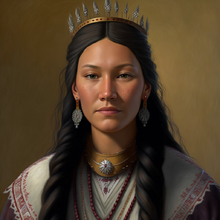Waynoka Running Wolf: Difference between revisions
(Created page with "{{Infobox royalty | name = Waynoka | image = | image_size = 220px | caption = | succession = Queen of Awasin | moretext = | reign = 4 May 1995...") |
m (prep for image) |
||
| Line 1: | Line 1: | ||
{{Infobox royalty | {{Infobox royalty | ||
| name = Waynoka | | name = Waynoka | ||
| image = | | image = waynoka.png | ||
| image_size = 220px | | image_size = 220px | ||
| caption = | | caption = | ||
Revision as of 21:57, 6 February 2023
| Waynoka | |
|---|---|
 | |
| Queen of Awasin | |
| Reign | 4 May 1995 – present |
| Coronation | 25 May 1995 |
| Predecessor | Askewhetu II |
| Born | 26 February 1977 Nikanassin, Awasin |
| Spouse | Senaka Morning Plume (m. 1995) |
| Issue Detail | |
| House | Makoyi |
| Father | Askewhetu II |
| Mother | Sinopa Oldchild |
| Religion | Atsimism |
Waynoka (Awasi: PRONUNCIATION) is Queen of Awasin. She was elected queen on May 4 1995, three days after the abdication of her father, Askewhetu II. She is a member of the Running Wolf branch of the Makoyi clan. She is the first woman to hold the position of monarch, though her grandmother Avasa White Quiver held the unofficial title of regent in the wake of the Crow Declaration.
Waynoka was born in Nikanassin, Awasin, the eldest daughter of Askewhetu Running Wolf and his wife Sinopa. She became crown princess at the age of two following her father's election in 1979. She received private instruction for her primary and secondary schooling, and received a degree in environmental history from Bochiket College. Her father's abdication in 1995, prompted by issues of health, led the Ohmakha'kina to nominate Waynoka as replacement, and she succeeded him shortly after. Later that year she married Senaka Morning Plume, with whom she has six children: Iksana, Kanti, Ayasha, Sinoa, Aran, and Nila.
Waynoka's reign has been characterized by a high level of foreign cooperation and involvement on a global level. She is a noted rhetorician, environmentalist, and equestrian, funding programs both domestically and internationally for the adoption of Awasi mustangs as race and pleasure horses. She has advocated for the preservation of traditional architectural practices and ecological outlooks within Awasin.